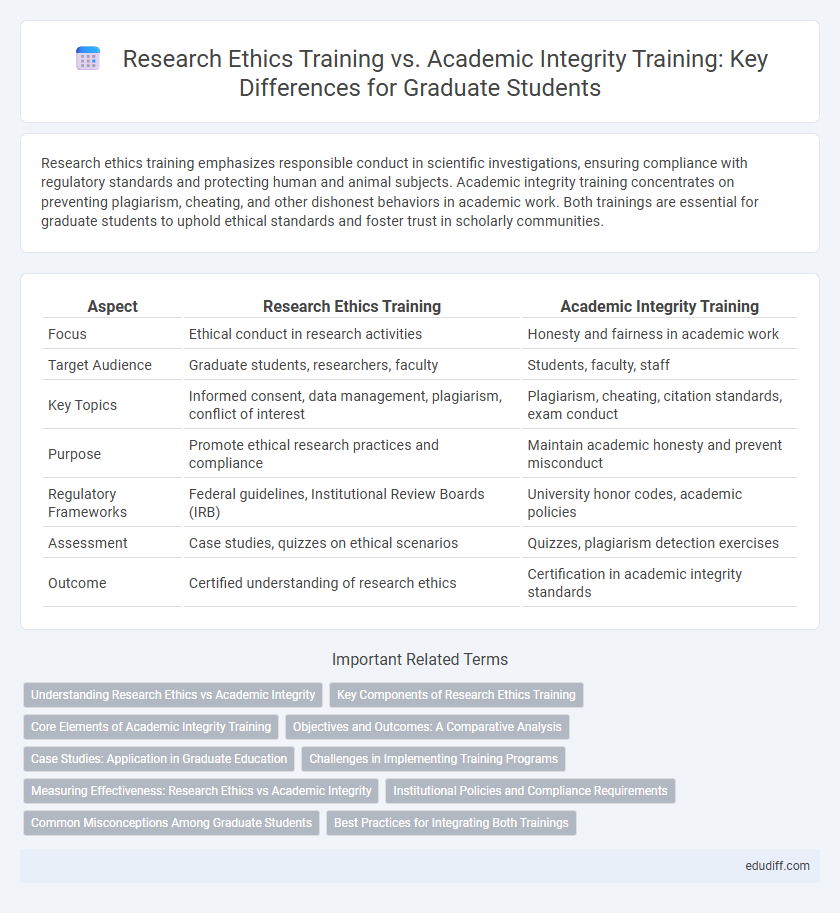Research ethics training emphasizes responsible conduct in scientific investigations, ensuring compliance with regulatory standards and protecting human and animal subjects. Academic integrity training concentrates on preventing plagiarism, cheating, and other dishonest behaviors in academic work. Both trainings are essential for graduate students to uphold ethical standards and foster trust in scholarly communities.
Table of Comparison
| Aspect | Research Ethics Training | Academic Integrity Training |
|---|---|---|
| Focus | Ethical conduct in research activities | Honesty and fairness in academic work |
| Target Audience | Graduate students, researchers, faculty | Students, faculty, staff |
| Key Topics | Informed consent, data management, plagiarism, conflict of interest | Plagiarism, cheating, citation standards, exam conduct |
| Purpose | Promote ethical research practices and compliance | Maintain academic honesty and prevent misconduct |
| Regulatory Frameworks | Federal guidelines, Institutional Review Boards (IRB) | University honor codes, academic policies |
| Assessment | Case studies, quizzes on ethical scenarios | Quizzes, plagiarism detection exercises |
| Outcome | Certified understanding of research ethics | Certification in academic integrity standards |
Understanding Research Ethics vs Academic Integrity
Understanding research ethics involves comprehending principles related to the responsible conduct of research, including data management, human subject protection, and publication standards. Academic integrity training emphasizes preventing misconduct such as plagiarism, cheating, and fabrication to uphold honesty within educational institutions. Both trainings cultivate a foundation of ethical behavior, but research ethics focuses on the broader responsibilities within research processes while academic integrity targets individual accountability in academic work.
Key Components of Research Ethics Training
Research Ethics Training emphasizes informed consent, confidentiality, and the responsible conduct of research involving human or animal subjects, ensuring adherence to ethical standards in study design and data management. It covers principles such as avoiding fabrication, falsification, and plagiarism, alongside compliance with institutional review boards (IRB) and ethical regulations like the Belmont Report. Understanding conflicts of interest, data sharing policies, and participant rights are key components that distinguish Research Ethics Training from broader Academic Integrity Training.
Core Elements of Academic Integrity Training
Academic Integrity Training focuses on core elements such as understanding plagiarism, proper citation practices, and fostering honesty in scholarly work. It emphasizes responsibility for original work, transparency in data reporting, and adherence to institutional policies. This training ensures graduate students maintain ethical standards that uphold the credibility of academic research and scholarship.
Objectives and Outcomes: A Comparative Analysis
Research ethics training emphasizes responsible conduct in research, including data management, human subject protection, and ethical publication practices, aiming to prevent misconduct such as fabrication or plagiarism. Academic integrity training targets honesty in academic work by promoting original scholarship, proper citation, and avoidance of cheating or plagiarism. Both trainings foster ethical behavior but focus on distinct environments: research settings for research ethics and academic coursework for academic integrity.
Case Studies: Application in Graduate Education
Case studies in Graduate Education highlight the practical differences between Research Ethics Training and Academic Integrity Training by showcasing real-world scenarios involving data fabrication, plagiarism, and authorship disputes. Research Ethics Training emphasizes responsible conduct in research processes, informed consent, and ethical treatment of subjects, while Academic Integrity Training focuses on avoiding cheating, plagiarism, and maintaining honesty in coursework. These case studies enhance students' understanding of ethical decision-making and reinforce institutional policies, ensuring compliance with funding agencies and academic standards.
Challenges in Implementing Training Programs
Challenges in implementing Research Ethics Training and Academic Integrity Training often include limited resources, lack of standardized curriculum, and varying levels of participant engagement across graduate programs. Institutions struggle to address cultural differences and ethical perspectives while ensuring consistent understanding of misconduct definitions. Measuring training effectiveness remains complex due to diverse academic disciplines and evolving ethical standards.
Measuring Effectiveness: Research Ethics vs Academic Integrity
Measuring the effectiveness of Research Ethics Training involves assessing participants' understanding of ethical principles, decision-making skills in complex scenarios, and adherence to responsible conduct in research activities. Academic Integrity Training effectiveness is evaluated by monitoring reductions in plagiarism incidents, improvement in citation practices, and fostering a culture of honesty in academic work. Both trainings require quantitative assessments, such as pre- and post-training surveys, and qualitative feedback to gauge long-term behavioral changes in graduate students.
Institutional Policies and Compliance Requirements
Research Ethics Training emphasizes understanding institutional policies related to responsible conduct of research, including human subjects protection and data management compliance. Academic Integrity Training focuses on adherence to institutional regulations preventing plagiarism, cheating, and ensuring honesty in scholarly work. Both trainings are essential for graduate students to meet compliance requirements and maintain ethical standards within academic institutions.
Common Misconceptions Among Graduate Students
Graduate students often misconstrue Research Ethics Training as solely preventing misconduct, overlooking its broader role in promoting responsible research practices. Many also confuse Academic Integrity Training with basic plagiarism avoidance, missing its emphasis on maintaining honesty and fairness in all scholarly activities. Clarifying these distinctions enhances compliance and fosters a culture of ethical scholarship in graduate education.
Best Practices for Integrating Both Trainings
Integrating Research Ethics Training with Academic Integrity Training enhances graduate students' understanding of responsible conduct in research and scholarship. Best practices include developing a unified curriculum that emphasizes ethical decision-making, data management, plagiarism prevention, and responsible authorship across disciplines. Collaboration between ethics officers and academic faculty ensures consistent messaging and reinforces integrity standards throughout the graduate education experience.
Research Ethics Training vs Academic Integrity Training Infographic

 edudiff.com
edudiff.com